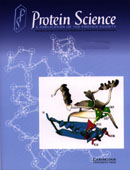Crossref Citations
This article has been cited by the following publications. This list is generated based on data provided by
Crossref.
Karlin, Samuel
and
Brocchieri, Luciano
2000.
Heat shock protein 60 sequence comparisons: Duplications, lateral transfer, and mitochondrial evolution.
Proceedings of the National Academy of Sciences,
Vol. 97,
Issue. 21,
p.
11348.
Horner, David S.
and
Embley, T. Martin
2001.
Chaperonin 60 Phylogeny Provides Further Evidence for Secondary Loss of Mitochondria Among Putative Early-Branching Eukaryotes.
Molecular Biology and Evolution,
Vol. 18,
Issue. 10,
p.
1970.
Klein, Gracjana
and
Georgopoulos, Costa
2001.
Identification of Important Amino Acid Residues That Modulate Binding of Escherichia coli GroEL to Its Various Cochaperones.
Genetics,
Vol. 158,
Issue. 2,
p.
507.
Brocchieri, Luciano
2001.
Low-Complexity Regions inPlasmodiumProteins: In Search of a Function.
Genome Research,
Vol. 11,
Issue. 2,
p.
195.
Yoshida, Takao
Ideno, Akira
Hiyamuta, Shuichi
Yohda, Masafumi
and
Maruyama, Tadashi
2001.
Natural chaperonin of the hyperthermophilic archaeum, Thermococcus strain KS‐1: a hetero‐oligomeric chaperonin with variable subunit composition.
Molecular Microbiology,
Vol. 39,
Issue. 5,
p.
1406.
Brocchieri, Luciano
2001.
Phylogenetic Inferences from Molecular Sequences: Review and Critique.
Theoretical Population Biology,
Vol. 59,
Issue. 1,
p.
27.
Levy-Rimler, Galit
Bell, Rachel E
Ben-Tal, Nir
and
Azem, Abdussalam
2002.
Type I chaperonins: not all are created equal.
FEBS Letters,
Vol. 529,
Issue. 1,
p.
1.
Stan, George
Thirumalai, D.
Lorimer, George H.
and
Brooks, Bernard R.
2002.
Annealing function of GroEL: structural and bioinformatic analysis.
Biophysical Chemistry,
Vol. 100,
Issue. 1-3,
p.
453.
Martin, C Cristofre
Tsang, Cemaine H
Beiko, Robert G
and
Krone, Patrick H
2002.
Expression and genomic organization of the zebrafish chaperonin gene complex.
Genome,
Vol. 45,
Issue. 5,
p.
804.
Kappé, Guido
Leunissen, Jack A. M.
and
de Jong, Wilfried W.
2002.
Small Stress Proteins.
Vol. 28,
Issue. ,
p.
1.
Fang, Yi-Chien
and
Cheng, Mingyuan
2002.
The effect of C-terminal mutations ofHSP60 on protein folding.
Journal of Biomedical Science,
Vol. 9,
Issue. 3,
p.
223.
2002.
Biomedical vignette.
Journal of Biomedical Science,
Vol. 9,
Issue. 3,
p.
185.
Yoshida, Takao
Ideno, Akira
Suzuki, Rintaro
Yohda, Masafumi
and
Maruyama, Tadashi
2002.
Two kinds of archaeal group II chaperonin subunits with different thermostability in Thermococcus strain KS‐1.
Molecular Microbiology,
Vol. 44,
Issue. 3,
p.
761.
Ashcroft, Alison E.
Brinker, Achim
Coyle, Joseph E.
Weber, Frank
Kaiser, Markus
Moroder, Luis
Parsons, Mark R.
Jager, Joachim
Hartl, Ulrich F.
Hayer-Hartl, Manajit
and
Radford, Sheena E.
2002.
Structural Plasticity and Noncovalent Substrate Binding in the GroEL Apical Domain.
Journal of Biological Chemistry,
Vol. 277,
Issue. 36,
p.
33115.
Sikora-Borgula, Aleksandra
Słomińska, Monika
Trzonkowski, Piotr
Zielke, Ryszard
Myśliwski, Andrzej
Węgrzyn, Grzegorz
and
Czyż, Agata
2002.
A Role for the Common GTP-Binding Protein in Coupling of Chromosome Replication to Cell Growth and Cell Division.
Biochemical and Biophysical Research Communications,
Vol. 292,
Issue. 2,
p.
333.
Maiwald, Matthias
Lepp, Paul W.
and
Relman, David A.
2003.
Analysis of Conserved Non-rRNA Genes of Tropheryma whipplei.
Systematic and Applied Microbiology,
Vol. 26,
Issue. 1,
p.
3.
Henderson, Brian
2003.
Heat Shock Proteins and Inflammation.
p.
175.
Khor, Hui Koon
Fisher, Mark T.
and
Schöneich, Christian
2004.
Potential Role of Methionine Sulfoxide in the Inactivation of the Chaperone GroEL by Hypochlorous Acid (HOCl) and Peroxynitrite (ONOO–).
Journal of Biological Chemistry,
Vol. 279,
Issue. 19,
p.
19486.
Choresh, Omer
Loya, Yossi
Müller, Werner E.G.
Wiedenmann, Jörg
and
Azem, Abdussalam
2004.
The mitochondrial 60-kDa heat shock protein in marine invertebrates: biochemical purification and molecular characterization.
Cell Stress & Chaperones,
Vol. 9,
Issue. 1,
p.
38.
Qamra, Rohini
Srinivas, Volety
and
Mande, Shekhar C.
2004.
Mycobacterium tuberculosis GroEL Homologues Unusually Exist as Lower Oligomers and Retain the Ability to Suppress Aggregation of Substrate Proteins.
Journal of Molecular Biology,
Vol. 342,
Issue. 2,
p.
605.


